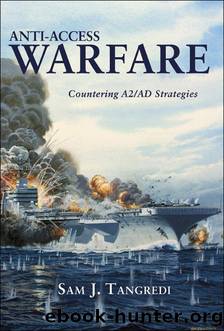Anti-Access Warfare by Sam Tangredi

Author:Sam Tangredi [Tangredi, Sam J.]
Language: eng
Format: epub
ISBN: 9781612511870
Publisher: Naval Institute Press
Anti-access Systems and Tactics
Although the Falklands War seems a âminorâ conflict in comparison to the other examples, modern anti-access systems and tactics were utilized by the Argentines, albeit with poor effect. Argentine forces did not have the capability to conduct a regional defense and keep the British outside of the South Atlantic. They could not strike at U.K. regional âbasesâ (such as they were), primarily Ascension Island, which was 3,300 miles (5,311 kilometers) from the Falklands. But their most effective weapons, air- and surface-launched antiship cruise missiles, would be a tool of any anti-access defense at sea. Land-based attack aviation was the primary Argentine anti-access combatant force, similar as it would be in larger engagements. Significantly overmatched, the Argentine command decided to withhold the surface naval forces that might normally be significant in sea denialâprobably a very wise decision. Submarine attacks on the task force were attempted, but ship for ship the Royal Navy had the worldâs most skilled antisubmarine watch teams. Argentina had no nuclear-powered submarines, and the operating distances stretched the capacity of diesel submarines.
A significant British advantage was long-range and satellite surveillance, bolstered by American assistanceâcapabilities Argentina did not possess even as a regional power close to the combat zone.
Argentina failed to use some anti-access systems and tactics within its capabilities. It made no use of sea mines, which would have been the most substantial threat to an amphibious landing. The probable reason was that the British response was unexpected and Argentine forces had limited time to sow naval minefields. Prewar Argentine diplomacy was unable to influence world opinion, both because its case was weak and because states of interest considered the junta odious. Argentina had similar territorial disputes with neighboring Chile, which may have also provided intelligence to the British. The Organization of American States (OAS) voted in Argentinaâs favor, but only Peru gave active assistanceâalthough some weapons may have come from the Soviet Union via Libya and Brazil.33 If so, they were too late or not of significance.
But the ineffectiveness of their efforts do not invalidate the reality thatâin the face of the qualitative advantages held by British forcesâthe only chance of Argentine success was to keep the task force away from the islands until time, attrition, and/or extrinsic events shook the determination of the attacker.
Download
This site does not store any files on its server. We only index and link to content provided by other sites. Please contact the content providers to delete copyright contents if any and email us, we'll remove relevant links or contents immediately.
The Radium Girls by Kate Moore(10924)
The Templars by Dan Jones(4199)
100 Deadly Skills by Clint Emerson(4092)
Rise and Kill First by Ronen Bergman(4026)
The Doomsday Machine by Daniel Ellsberg(3742)
The Rape of Nanking by Iris Chang(3530)
Killing England by Bill O'Reilly(3467)
Hitler in Los Angeles by Steven J. Ross(3450)
Stalin by Stephen Kotkin(3095)
12 Strong by Doug Stanton(3064)
Hitler's Monsters by Eric Kurlander(2741)
Darkest Hour by Anthony McCarten(2655)
Blood and Sand by Alex Von Tunzelmann(2615)
The Art of War Visualized by Jessica Hagy(2424)
Hitler's Flying Saucers: A Guide to German Flying Discs of the Second World War by Stevens Henry(2306)
The Code Book by Simon Singh(2222)
The Second World Wars by Victor Davis Hanson(2140)
Babylon's Ark by Lawrence Anthony(2077)
Tobruk by Peter Fitzsimons(2068)
